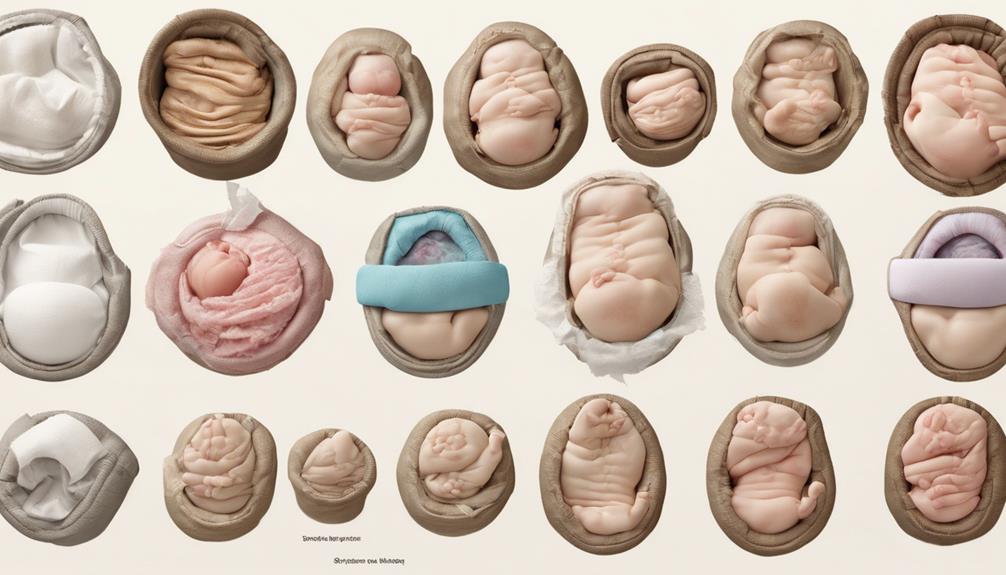As new parents steering the uncharted waters of newborn care, we often find ourselves scrutinizing every tiny detail for clues to our little one's well-being. It's like deciphering a cryptic message, where each diaper change holds a piece of the puzzle.
But just when we think we've cracked the code, a new consistency or color throws us for a loop, leaving us questioning what it all means. Understanding newborn poop consistency is not just about the mess in the diaper; it's a window into your baby's health and development that shouldn't be overlooked.
Key Takeaways
- Breastfed infants have more frequent bowel movements, aiding in early detection of abnormalities.
- Monitoring poop color helps identify potential issues like blood or liver problems.
- Changes in poop consistency, like diarrhea or hardness, may signal digestive issues.
- Consulting healthcare providers ensures proper management of newborns' poop consistency.

Qunclay Reward Jar for Kids Pot Training Reward Jar Classroom Incentive Good Behavior Responsibility Chart for Christmas Boys Girls Gift(Fresh Style)
Fun Design: the wooden reward jar for kids adopts beautiful and stylish design, with cute and stylish star…
As an affiliate, we earn on qualifying purchases.
As an affiliate, we earn on qualifying purchases.
Baby Poop Frequency
When monitoring baby poop frequency, parents should note that breastfed newborns typically pass stool multiple times a day due to the high digestibility of breast milk. Breastfed newborns often have more frequent bowel movements compared to formula-fed newborns because breast milk is easier for their bodies to break down. Understanding newborn poop frequency is essential as it can indicate the infant's digestive health and overall well-being.
Parents should establish regular poop patterns for their newborns to detect any abnormalities early on, such as signs of constipation in newborns. Infrequent bowel movements, especially if a newborn doesn't poop for four days or more, may signal a problem that requires medical attention.
Monitoring newborn poop is an essential aspect of caring for a newborn and plays a significant role in ensuring their well-being. By observing and understanding the poop patterns in newborns, parents can better support their infant's digestive system and health.

Pedia-Lax Liquid Stool Softener for Kids, Ages 2-11, Berry Flavor, 4 Fl Oz
Gentle Constipation Relief: Softens stool to ease occasional constipation in children.
As an affiliate, we earn on qualifying purchases.
As an affiliate, we earn on qualifying purchases.
Baby Poop Color Meanings

Observing the color of a baby's poop can provide important insights into their health and potential issues that may require medical attention.
Green baby poop in formula-fed infants is often attributed to the iron content in the formula, which can lead to a green hue in the stool.
On the other hand, red poop in a baby's stool may indicate the presence of blood, necessitating prompt medical evaluation to determine the underlying cause.
White or gray baby poop could be indicative of liver issues, potentially signaling a bile duct blockage that warrants medical investigation.
The presence of mucus in baby poop is typically harmless; however, if accompanied by other concerning symptoms, it might suggest an infection or digestive problems that require attention.
Monitoring changes in baby poop colors is vital for identifying abnormalities and seeking timely medical advice to address any potential health issues, particularly those related to blood or liver complications.

Ubbi Disposable Diaper Sacks, Lavender Scented, Easy-To-Tie Tabs, Diaper Disposal or Pet Waste Bags, 200 Count
Durable & Leak-Proof: Securely holds diaper waste or pet waste, ensuring leak-proof disposal with easy-to-tie tabs for a…
As an affiliate, we earn on qualifying purchases.
As an affiliate, we earn on qualifying purchases.
Baby Poop Consistency
Monitoring the importance of a newborn's stool is critical for evaluating their digestive health and detecting any potential abnormalities. When it comes to baby poop consistency, there are key factors to take into account:
- Breastfed vs. Formula-fed baby poop: Breastfed baby poop tends to be runny, yellow, and seedy in texture, while formula-fed baby poop is more formed and may have a firmer consistency.
- Normal baby poop: Normal baby poop can vary in consistency from soft and mushy to more formed, depending on the baby's age, diet, and hydration status.
- Color changes: Changes in poop consistency, such as sudden diarrhea or hard pellet-like poop, should be monitored closely as they can indicate digestive issues that need attention.
- Diaper changes and consulting a pediatrician: Regular diaper changes help in monitoring poop consistency, and consulting a pediatrician for guidance on maintaining normal poop consistency is essential for the baby's overall well-being.
Understanding these aspects of baby poop consistency can aid in identifying potential digestive concerns early on and ensuring the baby's health is well cared for.

Frida Baby Mobile Medicine Cabinet Travel Kit, Set Baby Essentials Gift Set Includes NoseFrida Snotsucker, Rectal Thermometer, MediFrida Medicine Dispenser with Portable Carrying Case
ALL-IN-ONE BABY HEALTHCARE ESSENTIALS ON THE GO: The Frida Baby Mobile Medicine Cabinet features a portable travel case…
As an affiliate, we earn on qualifying purchases.
As an affiliate, we earn on qualifying purchases.
Poop for Babies With Medical Needs

Babies with complex medical needs may exhibit variations in poop consistency due to underlying gastrointestinal issues requiring specialized attention. In cases where infants have had NICU stays or medical conditions, their poop consistency can be affected by factors such as NEC (necrotizing enterocolitis), a serious intestinal disease prevalent in premature babies. For some infants with medical conditions, bowel blockage or narrowing may impede normal bowel movements, necessitating surgical intervention to address poop-related issues effectively.
To highlight the importance of monitoring and managing poop consistency in babies with medical needs, the table below outlines key considerations for parents and healthcare providers:
| Key Considerations | Importance |
|---|---|
| Regular Monitoring | Crucial for detecting changes in poop consistency promptly. |
| Prompt Medical Attention | Vital for addressing any concerning poop-related issues swiftly. |
| Collaboration with Healthcare Providers | Crucial for effective management and treatment of gastrointestinal issues. |
For infants facing poop-related challenges due to medical conditions, proactive care and open communication with healthcare professionals are paramount to ensuring their well-being.
Consulting a Healthcare Provider
When seeking guidance on your newborn's poop consistency, consulting a healthcare provider is essential for accurate assessment and appropriate interventions. Healthcare providers play an important role in deciphering the normal and abnormal textures of baby poop. Here are some key reasons why consulting a healthcare provider is paramount:
- Professional Assessment: Healthcare providers can offer expert evaluation of any changes in your newborn's poop consistency.
- Guidance on Normalcy: They provide valuable guidance on what constitutes normal versus abnormal newborn poop consistency.
- Tailored Interventions: Healthcare providers can recommend personalized interventions or treatments based on your baby's poop consistency.
- Ongoing Management: Regular communication with a healthcare provider ensures proper monitoring and management of your newborn's poop consistency, promoting overall health and well-being.
Frequently Asked Questions
What Consistency Should Newborn Poop Be?
Our newborn's poop should be soft, runny, and seedy in texture. The change from meconium to regular poop occurs within the first few days. The consistency is influenced by breast milk or formula digestion.
What Does Unhealthy Newborn Poop Look Like?
Unhealthy newborn poop may vary from hard, pellet-like, to watery consistency, indicating potential health issues. Changes like persistent diarrhea or constipation, unusual colors (red, white), or mucus can signal digestive problems. Seeking medical advice early is essential.
When Should I Be Concerned About My Baby's Poop Texture?
When we notice significant changes in our baby's poop texture, such as excessive hardness or wateriness, it's crucial to contact our pediatrician promptly. These variations might indicate underlying health concerns that require evaluation and intervention.
What Should I Look for in Newborn Poop?
In newborn poop, we should look for soft, runny, seedy textures resembling mustard or cottage cheese. Changes may signal digestive issues or dietary adjustments. Monitoring poop consistency aids in evaluating health and digestion, important for newborn care.
Conclusion
To summarize, understanding newborn poop consistency is essential for parental monitoring and ensuring the baby's health. By observing frequency, color, and consistency, parents can identify potential concerns and seek timely advice from healthcare providers.
Remember, a baby's poop can provide valuable insights into their overall well-being, serving as a key indicator of health. So, keep a keen eye on those diapers like a vigilant guardian of gastrointestinal health.









